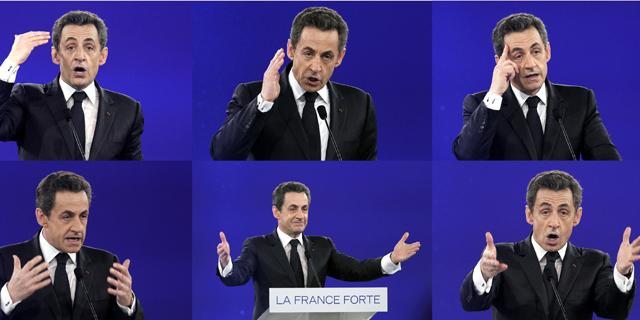Election year Euro-trashing in France
A combination made on March 13, 2012 shows file images of France’s incumbent president and Union for a Popular Movement (UMP) candidate for 2012 presidential election Nicolas Sarkozy delivering a speech during a campaign meeting on March 11, 2012 in Villepinte, out of Paris. Sarkozy pulled ahead of his Socialist rival for the first time in France’s election race on March 13, 2012 according to a poll conducted after the right-winger took a strident anti-EU turn.
BRUSSELS, Belgium – Incumbent Nicolas Sarkozy blames the European Union for overloading France with immigrants. Socialist frontrunner Francois Hollande complains it’s stifling growth. The hard left blasts Europe for undermining workers’ rights, while the far right sees a European “dictatorship” menacing French sovereignty.
More from GlobalPost: Francois Hollande, the anti-Sarkozy, makes his case
In a pugnacious weekend speech, Sarkozy warned that France would pull out of the emblematic treaty that permits passport-free travel among 26 European countries, unless measures are taken to prevent illegal immigrants from reaching France.
“Europe should not be a threat, but a source of protection,” Sarkozy told cheering supporters in a rally outside Paris. “A Europe that does not defend its frontiers, its interest, its citizens … will be condemned.”
His threat to withdraw from the Schengen Treaty, which tore down borders between EU nations, is the latest sign of how Europe has become a favorite target for politicians in a country that once fervently supported the EU’s drive toward “ever greater union.”
Although most mainstream French politicians — including Sarkozy and Hollande — still affirm their wholehearted commitment to European integration, they are painfully aware that the electorate has become more wary.
Many in France fear the EU’s economic policies have become under-regulated, threatening France’s social welfare and labor protection system.
In particular, the entry of 10 former-communist nations into the EU in 2004 and 2007 was perceived as a double threat: tempting companies to re-locate from France to low-cost countries like Slovakia or Romania; and allowing an influx of cheap workers into France — the “Polish plumber” became national bogeyman.
More from GlobalPost: For some in France, US is world's biggest problem
Since many of the new members looked to Germany or Britain as economic and political allies, France has also seen its influence in EU decision-making diluted.
Far-right candidate Marine Le Pen was the first to hitch on to the national mood ahead of the 2012 election.
Realizing the limitations of her National Front party’s traditional focus on immigration, she shifted euro-scepticism to the center of her campaign. Le Pen wants to scrap the euro, re-impose border controls and tear up the EU treaties.
“The euro and the opening of frontier controls to unfair competition have destroyed millions of industrial jobs, especially in France,” says her manifesto. “Europe has lost any semblance of democratic legitimacy.”
Sarkozy and Hollande denounce Le Pen’s plans as demagogy. But they are conscious of her 20 percent in the opinion polls, and both frontrunners have taken their distance from Europe.
Hollande has vowed to pick apart the treaty signed by 25 EU leaders this month, committing them to balanced budgets. His rejection of the “fiscal compact” has seen him cold-shouldered by some European leaders and led German Chancellor Angela Merkel to campaign openly for Sarkozy.
More from GlobalPost: Germany battles over future of solar
Trailing Hollande in most polls, Sarkozy’s speech on Sunday aims to pilfer votes from Le Pen, by offering a tougher line on immigration and Europe. He also demanded that the EU protect European industry through a “Buy European Act” inspired by "Buy American" provisions in the US.
“He wants to pick up votes and benefit from the anti-EU sentiment that is out there in the population,” says Thomas Kleine-Brockhoff, an expert on EU affairs at the German Marshall Fund of the United States in Washington. “It’s a wonderful thing if you are a national politician, that [you] can point the finger toward Brussels.”
It appeared to pay off for Sarkozy. A poll Tuesday showed him edging ahead of Hollande for the first time since campaigning began. However despite his criticism, Sarkozy’s attitude toward Europe is light-years from that of Le Pen. His speech affirmed that France remains dedicated to European unity as a bulwark against any repeat of the “barbarity” which led to two world wars and the Holocaust.
However, that commitment to unity — as an alternative to the rivalries which led Europe into the horrors of the past — has waned among younger voters for whom World War II and even the Cold War are subjects from an increasingly distant history.
While euro-scepticism among mainstream politicians used to be largely limited to Britain, election-time attacks on the EU are now common in several EU countries. Overtly anti-EU parties scored well in recent elections in Finland and the Netherlands and more moderate Euro-sceptics hold power in the Czech Republic. From opposite ends of the euro zone debt crisis Greece and Germany have both seen unprecedented verbal attacks on the European unity.
Either Sarkozy or Hollande is expected to win the second round vote on May 6. Whoever emerges victorious will likely moderate his euro-criticism. The EU, however, is almost certain to remain a scapegoat of choice for politicians in France and beyond.
We want to hear your feedback so we can keep improving our website, theworld.org. Please fill out this quick survey and let us know your thoughts (your answers will be anonymous). Thanks for your time!
